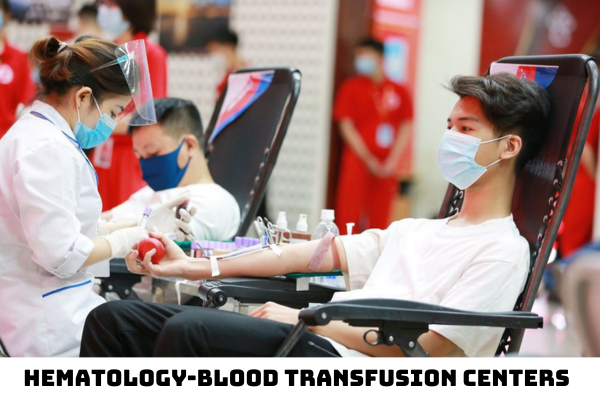Vietnam: By 2030, where will some hematology-blood transfusion and transplant centers be established?
By 2030, where will some hematology-blood transfusion centers and transplant centers be established?
On February 27, 2024, the Prime Minister of Vietnam issued Decision 201/QD-TTg 2024 approving the health facility network planning from 2021 to 2030, with a vision to 2050 with the following contents:
Plan for development of the health facility network
1. Allocation of the health facility network by 2030
...
Upgrade several provincial specialized hospitals into hospitals undertaking regional functions in oncology, cardiology, obstetrics/obstetrics - pediatrics, geriatrics, rehabilitation, traditional medicine, and infectious diseases to provide specialized technical services and establish some hematology - blood transfusion centers and transplant centers in some localities. For regions without specialized hospitals or facing difficulty in establishing specialized hospitals, priority should be given to the development of specialized centers in provincial general hospitals.
The spatial allocation orientation of provincial specialized hospitals undertaking regional functions is as follows:
+ Oncology specialty: Phu Tho, Hanoi, Nghe An, Da Nang, Ho Chi Minh City, Can Tho;
+ Cardiology specialty: Hanoi, Ho Chi Minh City, Can Tho;
+ Obstetrics/Obstetrics - Paediatrics specialty: Phu Tho, Hanoi, Hai Phong, Nghe An, Da Nang, Ho Chi Minh City, Can Tho;
+ Gerontology specialty: Can Tho;
+ Rehabilitation specialty: Ho Chi Minh City;
+ Traditional medicine specialty: Ho Chi Minh City, Nghe An;
+ Infectious disease - tropical specialty: Khanh Hoa, Ho Chi Minh City;
+ Blood centers: Hanoi, Thua Thien Hue, Ho Chi Minh City, Can Tho;
+ National Coordination Center for Human Organ Transplantation: Hanoi, Da Nang, Ho Chi Minh City.
Thus, provincial specialized hospitals will undertake regional functions in oncology, cardiology, obstetrics/obstetrics - pediatrics, geriatrics, rehabilitation, traditional medicine, and infectious diseases to provide specialized technical services and establish some hematology - blood transfusion centers and transplant centers in some localities.

What are the objectives of the health facility network planning during the 2021-2030 period in Vietnam?
According to subsection 2 Section II of Decision 201/QD-TTg 2024, the objectives of the health facility network planning during the 2021-2030 period in Vietnam are specified as follows:
(1) General objectives:
- Formulate and develop a national health facility network in accordance with the requirements of protecting, caring for and improving people's health, towards the goal of equity, quality, efficiency, and international integration;
- Ensure the succession, feasibility and suitability to the country's socioeconomic development conditions in each period;
- Improve the quality of medical services at the level of advanced countries in the region and the world.
(2) Specific objectives and targets:
- Develop a national health facility network capable of providing quality medical services to meet people's healthcare needs;
Ensure that each region has a general hospital that performs regional functions; develop specialized centers in general hospitals; upgrade several provincial specialty hospitals capable of providing intensive technical services to meet the health care needs of people in the region;
Develop several high-tech, modern specialized hospitals on par with advanced countries in the region and internationally.
Consolidate and develop the out-of-hospital emergency system;
Develop high-tech-intensive and intensive private hospitals that provide high-quality, technically advanced services, some of which are at the international level;
- Establish central centers for disease control and regional centers for disease control, upgrade provincial centers for disease control to ensure sufficient capacity for forecasting, surveillance and early detection, timely and effective control of epidemics and control risk factors affecting public health;
Establish level 4 biosafety laboratory for central centers for disease control, and level 3 biosafety laboratories for regional centers for disease control.
- Upgrade the national institute in the field of testing, inspection and verification of drugs, vaccines, bio-products, and medical devices to international standards;
Develop regional testing centers meeting national standards; develop national medical devices testing and calibration centers and medical laboratory quality control centers to meet the demand for testing, inspection and standardization of drugs, cosmetics, food and medical devices of provinces and cities in the region;
Develop research centers and centralized production areas on pharmaceuticals, vaccines, bio-products, and high-tech medical devices in order to enhance domestic production capacity and increase export value; establish a national research unit on technology transfer on vaccines.
- Improve the professional capacity of medical, forensic áxamination, and forensic psychiatric assessment facilities to meet assessment requirements.
- Develop the network of health facilities providing reproductive medical services; meet long-term care needs for the elderly.
- Strive to reach 33 hospital beds per 10,000 people by 2025, 15 doctors per 10,000 people, 3.4 pharmacists per 10,000 people and 25 nurses per 10,000 people;
By 2030, reach 35 hospital beds per 10,000 people, 19 doctors per 10,000 people, 4.0 pharmacists per 10,000 people, and 33 nurses per 10,000 people, the proportion of private hospital beds will reach 15% of the total number of hospital beds.
What is a Class 1 specialized hospital in Vietnam?
According to Section 5 Part I of the Hospital Regulations promulgated together with Decision 1895/1997/QD-BYT, there are the following provisions:
- Class 1 specialized hospital means a health facility under the Ministry of Health or the People's Committees of provinces and centrally-run cities and branches, performing specialized health check-ups in many provinces and cities.
- Class 1 specialized hospital has a team of specialized staff with high technical qualifications, modern equipment, and appropriate infrastructure.
Thư Viện Pháp Luật